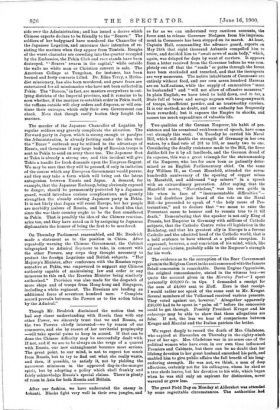Two qualities of the German Emperor, his habit of per-
sistence and his occasional recklessness of speech, have come out strongly this week. On Tuesday he carried his Naval Bill, which will double the strength of Germany in her own waters, by a final vote of 201 to 103, or nearly two to one. Considering the deadly resistance made to the Bill, the fierce dislike felt for it by all landlords, and the German dread of its expense, this was a great triumph for the statesmanship of the Emperor, who has for once been as patiently deter- mined as an English Parliamentary chief. On the same day William II., as Count Mansfeld, attended the seven. hundredth anniversary of the opening of copper mines in Mansfeld, and addressed "my miners" in a speech with an extraordinary peroration. After saying that the Mansfeld motto, "Nevertheless," was his own guide in life when in face of "insurmountable difficulties "- he had doubtless just heard of the vote on the Naval Bill—he proceeded to speak of "the holy cause of Pro- testantism," and to declare that "we mean to raise the Protestant cause to honour and to remain true to it till death." Remembering that the speaker is not only King of Prussia, but Emperor in Germany with millions of Catholic subjects, that the Catholic Centre rules all legislation in the Reichstag, and that his greatest ally in Europe is a fervent Catholic and the admitted head of the Catholic world, that is a bold sentence to have uttered at a public reception. It expressed, however, a real conviction of his mind, which, like all real convictions, probably adds to the Emperor's strength for his work.






































 Previous page
Previous page